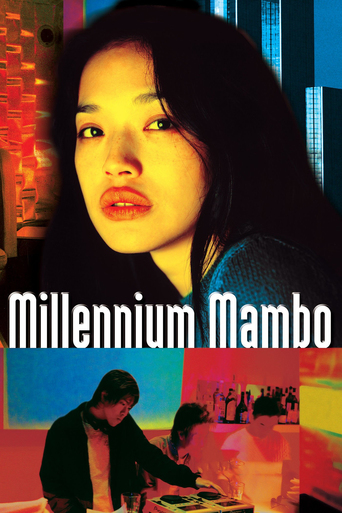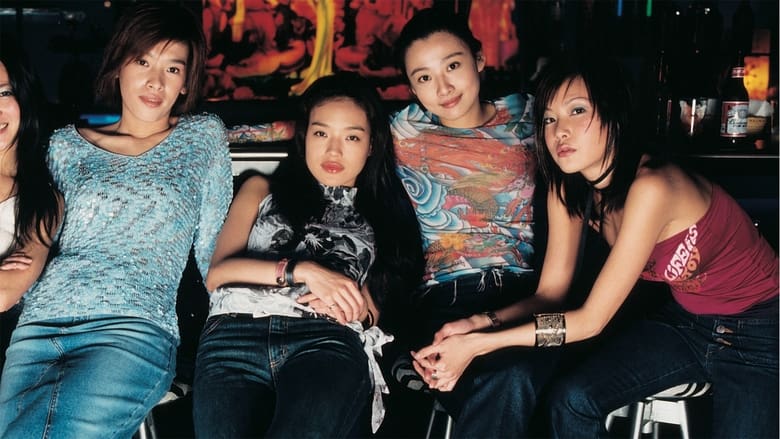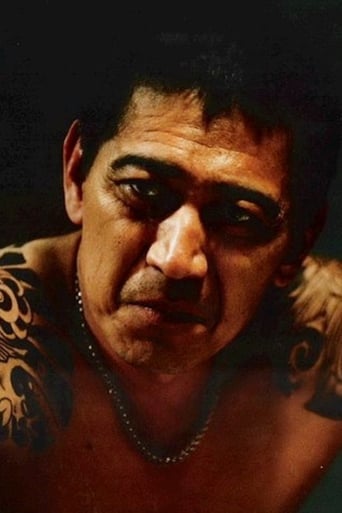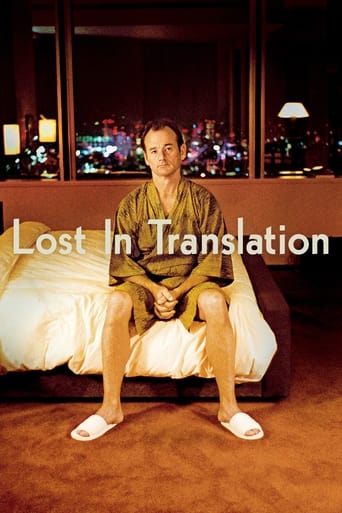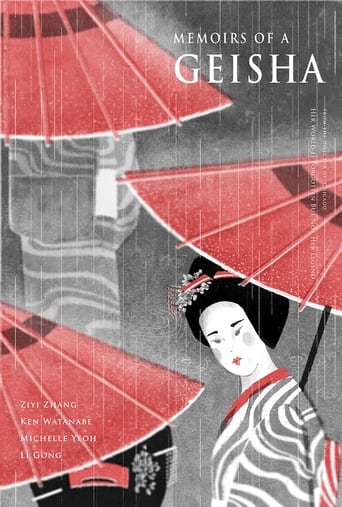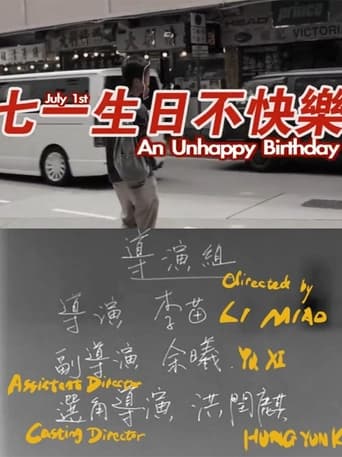Millennium Mambo (2003)
The youthful Vicky is torn between two men, Hao-Hao and Jack. At night she works as a PR person at a night club to support both of them. Hao-Hao keeps vigilance over her all the time, no matter she is on or off the job. He checks her charge accounts, telephone bills, mobile phone records, and even her body odor in an attempt to trace Vicky’s activities. She cannot stand him any longer; she runs away.
Watch Trailer
Cast


Similar titles
Reviews
Memorable, crazy movie
Let's be realistic.
Lack of good storyline.
I wanted to like it more than I actually did... But much of the humor totally escaped me and I walked out only mildly impressed.
Recap: This is the story about Vicky. Or not so much the story of, but the life of Vicky. We get to see a few episodes of her life, how she starts out with an abusive and jealous boyfriend and how she manages to leave him for Jack, a criminal that offers stability.Comments: This, as stated, is not a story. This is more of a picture, or a few pictures from Vicky's life. There is no real beginning, no real end, and hence no real story in between. We just get to see moments from her life. Moments from home, moments from work, and moments from nightlife.The pace is very slow, and it did not do very much to keep me interested. But something caught my eye. And that was that director Hou often chooses to place the camera in a way that I got the feeling it wasn't supposed to be there. It was not natural, it was almost like the camera was intruding. Many shots were from odd angles and shot through flowers, or through holes in the furniture. The actors were not naturally centered in the picture, and stuff happened both on and off camera. By doing so, to me, Hou really cemented that this was not a movie about a story, but more a look into Vicky's life.Interesting and as well done as that was, I still didn't enjoy it very much. Yes, beautiful in its own way, but much to slow-paced for me. To little to really keep me interested through the entire 100 minutes. But still nice to have seen once, as this is a typical award-winning movie.5/10
I'm sick and tired of reading complaints from people that this film (as well as most of Hou Hsiao-hsien's others) are too boring, impersonal, detached, plotless, etc. Generally speaking, people don't just casually walk into one of Hou's films; chances are, if you go and see one, you already know basically what to expect -- which is, more or less, the polar opposite of Hollywood-style filmmaking. That said, Hou's films are among the most artful, innovative, breathtaking, and purely cinematic (in the absolute best sense of the word) made today, and Millennium Mambo is certainly no exception. In fact, I would even rank it as one of Hou's five best films (along with Flowers of Shanghai, Goodbye South, Goodbye, The Puppetmaster, and A Time to Live and a Time to Die).The film is exquisitely photographed by Mark Li Ping-bin, whose camera here is even more hypnotically mobile than usual, and -- perhaps to an even greater extent than in any of Hou's previous features -- takes on an ambiguously voyeuristic role. There are scenes in Millennium Mambo that are among the most haunting and beautiful in, not only Hou's cinema, but in all modern world cinema. The opening voice-over sequence (that calls to mind the best voice-over work from the films of Wong Kar-wai and Terrence Malick), the scene where Vicky lies in bed with the window reflection of the untuned television sumperimposing the passing trains behind her, and the scene set amidst the snowdrifts are probably the finest examples, but there are countless others, as well. Shu Qi is positively luminous in the film's central role. Her performance is, at times, even reminiscent of those by Anna Karina, Liv Ullman, and Monica Vitti for Godard, Bergman, and Antonioni, respectively. The supporting performers (especially Jack Kao) are also superb.As you can probably guess, I love Hou Hsiao-hsien and Millennium Mambo. I will be the first to concede, however, that his films are decidedly not for all tastes. They are usually very deliberately-paced, sometimes require knowledge of Asian (almost always Taiwanese) history (which means - god forbid - research for most viewers), and never feel in the slightest like Hollywood product. Now you've been warned. If this doesn't sound appealing or entertaining to you, then go watch Pearl Harbor. But if it does, I highly recommend that you check out Millennium Mambo (as well, as Hou's other films - all of which are genuinely worthwhile).My rating: 10/10
Hou's latest film, I saw as part of Village Voice's Best Undistributed Films of 2001 series, feels like a mixing and modulation of his last three: a young woman's abortive but contemplative contemporary existence (GOOD MEN, GOOD WOMEN), a moment-by-moment addiction to thrill-seeking (GOODBYE SOUTH GOODBYE) and a love affair entombed in drugs (FLOWERS OF SHANGHAI) all figure into Hou's attempt to lyricize the moment we are living in -- NOW. The result is a film that seems immensely fascinated in each moment it is capturing -- luminescent bodies dancing in an underground rave; a man inhaling and exhaling smoke from a makeshift bong; the absolute wonder of one's facial imprint in an immaculately white snowbank -- until those moments lead to other moments of inescapable banality or dread. Hou enhances this addiciton-to-the-moment with a voice-over that takes place in 2010, giving away plot points before they happen on-screen; since narrative convention no longer matters, the result is an even more intense experience of the moment tied in with an odd sensation of retrospection (no one messes around with the concept of history more than Hou). The give-and-take of this kind of project is that not everything will succeed on a dramatic level, but the experience of this film (and I do mean *experience*) is too exquisite to be denied. There are no less than half a dozen moments in this film, easily the most sumptuously photographed of the year, whose sheer beauty in harmonizing time and image are timeless treasures: objects and settings seem to take on a life of their own, before they are inevitably swept under the ever-moving carpet of time.
A hollow life is observed clinically but sympathetically in this melancholy, graceful film, which is itself hollow but compelling, like the dance beat it is set to. The director uses a convention I hadn't seen since early silent films: a summary description of an action, followed by its acting out. Also, the story is narrated from a time yet to come. These devices create the sense that the events have happened before--as they have, in the cyclical, purposeless life we are witnessing--and also that they are inevitable. The story is narrated in the voice of the leading character, but in the third person: an older self from a real future? or an alternate reality? or only her imagination? The narration is necessary as a comment on the characters' behavior because in the numb and mindless hedonism that draws them in and keeps drawing them (she keeps leaving the boyfriend who embodies this life style but keeps returning to him) they are never shown as capable of thought. Whether the film means to say that, or is simply limiting its view and depth of field to exclude their thoughts as peripheral to their lives, this lack works to unconvince us. The characters are shown in attitudes of thought but never speak anything like a thought, even a stupid one; they are moved entirely by want and impulse. The hedonist boyfriend is shown as having friends; how? Nobody not brain-dead exists in a state of pure mindlessness. That is the view of parents whose adolescent refuses to talk to them: who can understand these kids? This film describes a life--and this is an interesting accomplishment, but a relatively narrow one. More difficult, in this milieu, and ultimately more interesting would have been to discover the person whose life it is (or will have been).

